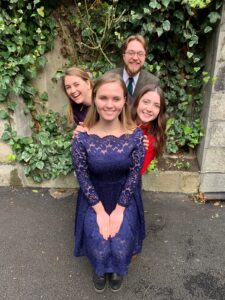This time last year, I was at a retreat center in County Wexford with the other six House of Brigid volunteers, playing games, catching up after the Christmas break, and refocusing ourselves on our mission as we went into the new year. Prior to Christmas, we had all received copies of C.S. Lewis’s The Four Loves, and we were asked to read parts of it in preparation for the retreat.
I’ve spent a lot of time in quarantine reflecting on this past year and a half of House of Brigid. When I first read that book, I could definitely make some connections between community life and the forms of love that C.S. Lewis was describing, but this past year of intentional community has made those connections all the more apparent.
There have been no retreats for the two communities this year, and there has been very little exploration of the city. Community life with the House of Brigid is intense in a regular year, as we both live and work together, but this has been compounded this year by the fact that the four of us only ever socialize with one another. I find myself increasingly frustrated that the other three don’t get to experience the Dublin that I knew last year. The four of us get along very well, and so spending time with them has been one of the easier parts of this year, but I’m sad that they haven’t yet met most of our parishioners in person.
I don’t mean to complain; this year has been incredibly difficult for everyone, and I feel so blessed to be here and able to help my parish in whatever ways I can. In fact, the increased intensity of this year’s community life has given me a greater appreciation for the love present in human relationships, and the love present in our relationship with God.
In the introductory pages of The Four Loves, C.S. Lewis differentiates between “Gift-love” and “Need-love.” The former is a love that selflessly provides for another person, as a parent cares for a child, while the latter is a love that recognizes dependence upon another person, as a child looks to its parent for comfort and protection. Lewis states that God’s love for humanity is almost entirely “Gift-love,” while our love for God is almost entirely “Need-love.” He describes this human condition of dependency in one of my favorite quotes from the book: “But in the long run it is perhaps even more apparent in our growing—for it ought to be growing—awareness that our whole being by its very nature is one vast need; incomplete, preparatory, empty yet cluttered, crying out for Him who can untie things that are now knotted together and tie up things that are still dangling loose.” The more we learn about God, the more we are aware of how small we are, how helpless and incomplete, without Him.
This year has been an exercise in relinquishing control. I can make plans for my life, plans for next year, plans for one week from today, and those plans could all be meaningless. What I expected from this second year with the House of Brigid is not what I got, and that’s alright. It’s taken me a while to come to this place of peace, but I’ve been able to contextualize this year in terms of “Need-love.” I need God to untie all the knots of this year, and I need to be able to lean on my community.
This has been particularly important for my personal growth, as I often find myself falling into the trap of thinking that ministers must always display “Gift-love.” We have to constantly give of ourselves until there’s nothing left. Earlier this year, overwhelmed by all of the tasks that were piling up as we prepared for our Christmas liturgies and frustrated by the prospect of another lockdown, I sat in my office and cried. I don’t like to cry in front of other people, because I feel guilty for bringing them into my pain. On this particular day, my community member accidentally walked in on me, and it led to a really beautiful conversation and a hug. I felt so much better for being able to talk through what was happening, and I was able to let her love me and recognize my “Need-love” for her.
It’s not shameful to depend on others; we don’t look down on a child for needing his mother. I am so grateful for the times in which my community has showered me with “Gift-love.” Often, I don’t do anything to warrant such selfless love, but they give it to me anyway. I hope that I am able to do the same for them. Through the giving and receiving of love through this incredibly difficult year, I have learned how pure the love of God is for humanity. We do nothing to deserve His love, and yet we continue to receive it, unconditionally. I’m never going to fully understand the gravity of this “Gift-love,” but this year has made me more prepared to open my heart and accept it.

